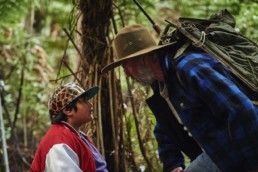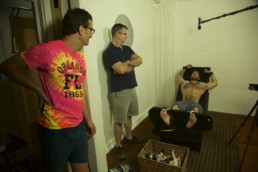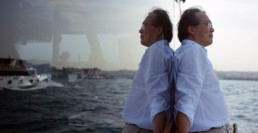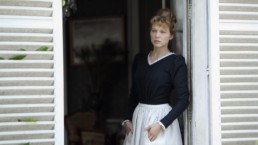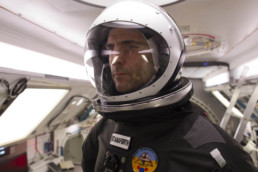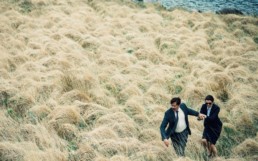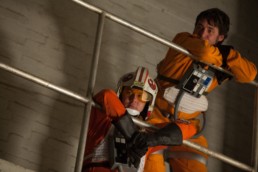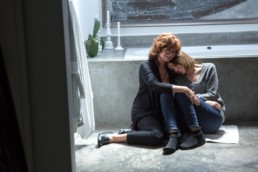Heartfelt 'Hunt for the Wilderpeople' Bursts With Laughs
Coming off of his 2014 little-seen but well-received hit, the New Zealand vampire-mockumentary "What We Do in the Shadows," writer/director Taika Waititi fleshes out his cheeky brand of deadpan humor in his follow-up comedy "Hunt for the Wilderpeople." This fun adventure story bursts with laughs and surprisingly heartfelt pathos and can be considered his all-around best movie yet.
Waititi previously hit the hammer on the nail – or rather, coffin – in "Shadows" (starring the dryly hilarious Jemaine Clement) by making audiences laugh throughout the whole movie, not sparing any joke that could perfectly punch up a moment. It is clear Waititi is skilled and gifted in his comedic sensibilities. It's this strength of his that shines through in his movies, including "Wilderpeople," which shows his instincts as a comedian who understands how to craft a deadpan comedy that not only makes a movie move from beat to beat and joke to joke, but presents a heartfelt story as well. If it's Waititi's comedic style that makes "Wilderpeople" a gem, it's to the credit of the movie's cast who brings that comedy to life, their characters being both ridiculously funny and yet so rich in heart and empathy, giving substance to an otherwise quirky and off-beat comedy.
Our main character is Ricky, played by newcomer Julian Dennison in a breakout role who anchors the movie not only with his weighty figure but also with his cheeky one-liners and wannabe gangster rap attitude, a front that clearly reveals his reluctant wish for love, being a foster care child. If his comically-anarchic swagger has upset other families, his new adoptive mother Bella (Rima Te Wiata) would love him just the same, allowing him to run away from home whenever he wants (just as long as he's back for breakfast). Certainly, the Child Services lady Paula (Rachel House) is happy to be rid of Ricky, as she covers up that his past is full of punching stuff, kicking stuff, burning stuff and stealing stuff. A watchful eye is also had by his weary "Uncle" Hec (Same Neill).
Without giving much else away, the movie turns into an unexpected adventure movie, with Ricky and Hec finding themselves in the situation of being on the run from the authorities (and a hilariously diligent Paula), leaving the boy and reluctant guardian to survive in the New Zealand forest, with all of the dangers and enemies that wish to hunt them down. The comedy comes a mile-a-minute, balancing from light chuckles to hearty gut-laughs, yet is built on a foundation of love and acceptance, as Ricky and Hec both change and grow in spirit from the beginning to end.
At a time when comedies in the U.S. range from Hard-R genre a la "The Hangover" and "Trainwreck," "Hunt for the Wilderpeople" is a much-welcomed movie to watch with family and friends. It's certainly a movie that will intrigue audiences to watch Waititi's previous movies, as well as anticipate his next big-screen outing (the sizeably bigger "Thor: Ragnorak"), proving that Waititi has become a director that we should join on any adventure.
"Hunt for the Wilderpeople" is rated PG-13 for thematic elements including violent content, and for some language. 101 min. In select cities this Friday.
'Tickled' Hits Both the Funny Bone and a Dark Nerve
Everyone knows what it's like to be tickled. What starts out as innocent fun, after enough time, quickly turns into convulsing bodies, possessed with uncontrollable hilarity.
This lack of control is also what tickling inherently requires: vulnerable people who are defenseless victims to it.
In the new documentary "Tickled," journalist David Farrier reveals the unbelievable real-life story of "competitive tickling," a ridiculous premise that only reveals the darker, more surreal story behind it.
"Tickled" starts out in light-hearted fun, in which Farrier (who stars in and directs the doc), looking for a new story, discovers the world of "competitive tickling." After a message to the organization, he receives a response back from a mysterious woman, saying that the organization would rather not associate with him, being an openly gay man. Farrier doubles down and throws himself into the world, where fake names, false fronts for non-existent companies, and threatening blackmail lie dormant.
https://www.youtube.com/watch?v=iOBXuCYB4jQ
The early premise is entertaining until a group of lawyers travel from the U.S. to Australia (his home-turf) to meet with Ferrier to dissuade him from pursuing any further. It's here where the tone shifts, and where things lessen in humor and grow in intrigue and mystery.
It's this tonal shift that makes "Tickled" so compelling. Ferrier and a cameraman colleague travel to the U.S., where they locate and attempt to enter a "competitive tickling" match. This leads to his own harassment some days later from the desk of the same woman who had threatened Ferrier before, as well as countless other unsuspecting victims who had signed up for these events, only to have the entirety of it held over their head as blackmail.
What ultimately keeps "Tickled" from affecting further is that it seems to end short of concrete resolution. Investigative documentaries like Netflix's "Making a Murderer" and HBO's "The Jinx" almost seem to come loaded with justice-laden endings, but it's to Ferrier's novice documentary experience that we don't ultimately witness any further justice being served. The final act does amount to Ferrier finding the person behind it all, but after so much build-up, the finale leaves viewers just short of satisfying conclusion. But for those looking to have not just their funny bones engaged, "Tickled" offers a bit more behind the surface.
"Tickled" is not rated. 92 min. In theaters this Friday.
Yo-Yo Ma Unites Us All in 'The Music of Strangers'
There is a moment early on in director Morgan Neville’s new touching, incredible documentary, "The Music of Strangers," that perhaps fully encompasses the theme of this movie. It’s a beautiful scene, seeing people of diverse backgrounds and cultures meet for the first time to perform music together. And though language is shown to be a communication barrier between them, they figure how to arrange their different instruments to create more than symphonic composition; they achieve a certain kind of empathy and understanding. A certain kind of peace.
In "The Music of Strangers: Yo-Yo Ma and the Silk Road Ensemble," Neville captures the story of famed cellist Yo-Yo Ma and how he brought people of different cultures and backgrounds together to perform as one ensemble and through one, shared language: music.
This attempt, of course, is The Silk Road Project, and the band leader behind it is famed cellist Yo-Yo Ma–a man who, for all of his awards, accomplishments, and esteem, found himself driven to search beyond technical mastery for a deeper meaning in his life’s pursuit of music.
https://www.youtube.com/watch?v=SShFP7QfSCg
And so, in 2000, the virtuoso held a retreat to bring a curated group of international musicians together who would later perform as The Silk Road Ensemble. Brilliantly talented musicians including Kinan Azmeh, Keyhan Kalhor, Cristina Palo, and Wu Man each play instruments specific to their culture and region. They show that, though coming from different places and with different musical stylings, they can create beautiful music together.
In "Strangers," director Morgan Neville returns to similar themes that earned him an Academy Award for Best Documentary Feature with his 2013 film, "20 Feet From Stardom”– a doc that also features humans expressing themselves through the performance of music. Once again, Neville shows his deep interest in highlighting the one's connection to expression, affirmation, and relationship with music.
The movie contains interviews from all of its principle musicians who talk about their different backstories and struggles that have caused conflict in their home countries. When the story of The Silk Road Ensemble reaches its end, the documentary shifts to touch on a number of current political issues, such as the Syrian Refugee Crisis, which makes for a somber and empathetic takeaway.
If you are looking for an incredibly performed and photographed live music movie, or looking for a story about people of different cultures coming together to play and share in their pursuit of art, or even just to hear Yo-Yo Ma crack wise and funny one-liners, "The Music of Strangers" does a fantastic job of capturing not just the music, but the heart that unites us all.
"The Music of Strangers: Yo-Yo Ma and the Silk Road Ensemble" is rated PG-13 for brief strong language. 96 min.
Léa Seydoux Lends Desire as Célestine in 'The Diary of a Chambermaid'
Adapted from Octave Mirbeau's original 1900 novel ("Journal d'une femme de chambre"), which has already had two successful film adaptations from masters Renoir and Buñuel, "The Diary of a Chambermaid" gets its third telling for the big screen, this time from director Benoit Jacquot.
Léa Seydoux follows in the footsteps of Paulette Goddard and Jeanne Moreau to play the role of Célestine, a young Parisian chambermaid whose beauty and desirability highlights the class system and social milieu of the time.
The movie follows the dutiful and desirable young chambermaid Célestine from serving one house to the next, Séyodoux bringing her sly and knowing smile to each new master. Starting out tending to the Lanlaire house with the stuffy Madame (Clotilde Mollet) and her groping husband Monsieur Lanlaire (Hervé Pierre), she catches the eye of the brooding gardener Joseph (Vincent Lindon) before eventually returning to her first destination, ready to break free for good.
https://www.youtube.com/watch?v=tB0dYkbA7AE
Nominated for the 2015 Golden Berlin Bear (the highest prize awarded for the best film at the Berlin Film Festival), "Chambermaid" is clearly made excellently and with a high pedigree. Jacquot, who also co-wrote the screenplay with Hélène Zimmer, attempts to infuse a certain kind of post-Freud modernity to this telling, showing the repressions and compulsions of both the high and low class that surrounds Célestine.
While Jacquot's intent to combine the period-piece story with modern touches feels like an exciting update, the result is overbearing. Jacquot's choice to modernize the movie creates fissures that expose the distracting worlds of old and new.
Choices to infuse French-translated "for sure," are out of place, and the camera's perplexing and zoom-ins on characters' faces pulls the audience out every time. Couple this with choppy leaps in time and the result leaves scattered instances of individual strengths but compounded together, makes for an unfocused movie.
"The Diary of a Chambermaid" has many strengths, including its wonderfully rich world led by costume and production design and art department, even if the movie stalls out in its uneven adaptation.
'The Diary of a Chambermaid' is not rated. 96 min.
'Approaching the Unknown' Won't Have the Search Team Called
Apparently, movies have yet to learn by now the dangers of sending but a few scarce humans–in this case, just one–beyond Earth's reaches and into the vastness of space to save humanity from some planet-threatening problem. Of course, this risk of the 'what can go wrong does go wrong' variety, drives a time-tested plot of which audiences are readily entertained; just look at recent cinema, "The Martian," "Interstellar," and "Gravity" for proof.
The real danger that movies should be wary of is building a story around this premise alone, and without adding anything new to the equation. The result, which the latest solo-in-space-survival flick "Approaching the Unknown" shows, is that audiences will fail to care if that character is fated to drift further and aimlessly out of orbit and into the forgotten beyond. While there might be enough familiar elements to satisfy those who are looking for something akin to background-watching, "Approaching the Unknown" doesn't have enough original elements to generate the inertia of interest necessary to captivate viewers in its own right.
The astronaut whose fate we are tied to is William D. Stanaforth (Mark Strong), on a one-way, sacrificial trip to Mars to colonize the planet for the rest of humanity–if he doesn't perish before arriving. A former military man with instinctual intelligence and steely conviction, Stanaforth is also loaded with lazily tacked-on self-affirmations ("I'm not going to Mars to die; I'm going there to live."), making him a comparable but cliche fixture to spend a full ninety minutes with.
https://www.youtube.com/watch?v=CQx2eosUlXY
Strong, last seen in this year's underperforming Sacha Baron Cohen spy-spoof "The Brothers Grimsby," lends his action-hero looks and serious resolve to playing Stanaforth and it's to the actor's strengths that he brings the character to life. While he seems like the perfect person to have in a real-life situation–brilliant enough to discover a process to create water from dirt and fearless enough to disobey orders to manually fix his ship in a bind from Earth-residing NASA engineer and old pal Louis 'Skinny' Skinner (Luke Wilson), his cold exterior doesn't lend itself to drawing the audience in, and proves the whole thing could use a little more humor and heart.
You can tell before it's over that "Approaching the Unknown" is a movie that didn't spend its efforts trying to differentiate itself from other sci-fi movies as it does attempting to cash in on their successes. Sure, a few flashback scenes of Stanaforth convey his detachment from non-existent family and friends back home, but there's nothing beyond his person that amounts to be developed. You're probably already braced for when the solitarily-confined character loses his grip on reality, talking to himself and hallucinating characters from his emotional past. But all of this within the first twenty minutes? It fast-tracks all of what the movie has to offer in the blast-off stage alone.
While "The Martian," "Interstellar," and "Gravity," show that battling elements and confronting the certainty of death can do more than simply entertain audiences (each being commercially and critically received and Awards-positioned), Strong's strengths aren't in the department of amiability and warmth, unlike Matt Damon in "Martian," or Matthew McConaughey in "Interstellar (or even Tom Hanks in "Apollo 13"), actors whose ingenuity comes second to their naturally likable selves. It seems the bigger irony that first-time writer/director Mark Elijah Rosenberg doesn't get right in his directorial debut is that the greater the dazzling technology, the greater a natural human presence must be there for us to relate to. Unfortunately, it doesn't look like the search team will be getting called for this failed mission.
"Approaching the Unknown" is rated R for language. Now playing in select theaters and On Demand.
'The Lobster' and the Absurdity of Modern Love
In this modern age, where more and more human relationships are being facilitated online – apps like Tinder making romance and falling in love almost binary in nature – is it any wonder why we might now feel like we’ve lost just a bit of our collective humanity, and why the whole thing might even be seen as, laughable?
In the new ambiguously titled film “The Lobster,” director Yorgos Lanthimos (“Dogtooth”) sends
up this idea to make a darkly absurd, yet hilarious and thoughtful look at the amount of similarly programmed, artificialized, confining rules and structures that humans have put into place to connect with others. In stretching the joke to its most absurd, silliest places, “The Lobster” makes for a wonderfully stylish satire with its poignancy and lasting punch. For our interview with Lanthimos, visit www.cinemacy.com.
“The Lobster” takes place in a dystopian, near future world, where single people (according to the laws of ‘The City’) are arrested and taken to ‘The Hotel,’ where they must find a romantic partner in forty-five days or else (cue the absurd twist) be turned into an animal and released into the woods (it's not so cruel – they get to choose which animal they would like to be turned into to live out the rest of their days).
John C. Reilly, Ben Whishaw, and Colin Farrell need to find a mate in "The Lobster."
In the lead role, Colin Farrell packs on a pudge to play the wireframe-wearing sad sap David (the only named person in the film, the rest of the characters being defined as Nosebleed Woman, Loner Leader's Father, and so on), who, in the film’s first scene, is seen as just the latest victim of relationship-ending heartbreak. Farrell, pivoting 180 degrees from his macho and hard-boiled character in HBO's less-than-satisfying second season of "True Detective," gets laughs right off the bat. Farrell proves, with his bushy mustache groomed over his tight-lipped mouth, that he can do the deadpan comedy in spades.
After seeing David unlucky in love, we are introduced to The Hotel, where David and the rest of the other singles are housed and watched under scrutiny by the staff. It is here where we learn the rules of this world – singles check-in at the front desk, exchange the clothes on their back for navy sport coats and flower-printed dresses, are logged into the system, and learn that they must find, not so much "love," as a romantic partner, a mate for life, within 45 days.
Understandably, all singles are largely silent and awkward in their behaviors, including Ben Whishaw and John C. Reilly, who attend The Hotel's hilariously awkward staged talks regarding the dangers of living alone and attending the just-as awkward dances. Singles are also shuttled to the surrounding forest with tranquilizer-loaded hunting rifles, to tag and bag the rogue singles living outside of The City's laws. Successfully neutralizing a “Loner” will add another day to their stay at The Hotel, upping the chances of finding a mate. It's a route that leads David to the Loners, including the Short Sighted Woman (Rachel Weisz), a fellow single who lives under the rule of the Loner Leader (Léa Seydoux). The twist here is, even outside of The City’s watch and The Hotel's confines, living in the forest as a devoted single shares its own equally inhibiting and just as dumb rules. It is here that Lanthimos drives the point home, societal structures that are put in place in the effort to control one’s relationship status is a doomed, fool’s errand.
"The Lobster,” is wildly unexpected, unique, and plays the absurdity of this world with winning deadpan humor throughout. It affirms the reality where people are turned into animals, but even they have boundaries, as a single is wisely advised by a superior that a camel and a hippopotamus wouldn't end up together, because "That would be absurd... think about it.” The modern age intelligentsia poking fun at the state of human behavior to control nature's effect in utilitarian effort is entirely Twain-like, and makes for one of the year’s most unforgettable stories.
https://www.youtube.com/watch?v=vU29VfayDMw
1 h 58 min. Rated R for sexual content including dialogue, and some violence. Now playing in select theaters, including the ArcLight Hollywood.
Documentary 'Elstree 1976' Is a Tribute to the Unknown Faces of 'Star Wars'
Amidst the recently renewed "Star Wars" mania, with the beloved franchise's acquisition and and re-boot by Disney with last year's behemoth blockbuster, Star Wars: The Force Awakens, new stories, worlds, and characters have been introduced to new audiences. But a long time ago–or rather, "About forty years ago, in a suburb of North London..."–a then, fresh-faced and unknown cast of actors and extras took jobs to make a movie that would later send ripples through the universe, which are still felt today, and for future generations to come.
Those actors have gotten their fifteen minutes of fame extended in Elstree 1976, a new, dutifully made and honorably praising documentary that gives the background and lesser-known actors face-time in the spotlight. With its running time of one hour and thirty minutes, it's a stuffed movie with a number of actors telling their stories of how Star Wars affected their lives, which, with its heavily nostalgic, leaning on somber tone, should excite only the most die-hard of fans.
"How many actors can say they've got their own action figures?" It's a fair question, and one that writer/director Jon Spira digs into with his documentary (fundraised by Kickstarter), comprised of sit-down interviews of the people that lent their faces (and some only their bodies) to a movie that would become the most popular of all time–even if those people didn't know it at first.
"It didn't seem anything special to me. I thought it was a low-budget film to begin with," says one Star Wars actor, and it's the same sentiment that all of the interviewees generally share. Of course, it was–absolutely nobody could have predicted that success, with its wacky sci-fi costumes and set pieces and space-serial story about the "the Force." But after the Death Star's space dust settled, 25% of the planet's 8 billion inhabitants have been statistically polled as having seen the classic space opera; reasoned in the movie, meaning roughly 2 billion people have seen these lesser known people filling in the rest of the roles and spaces surrounding such actors as Mark Hamill's Luke Skywalker, Alec Guiness' Obi-Wan Kenobi, Carrie Fischer's Princess Leia, and the director himself, George Lucas.
https://www.youtube.com/watch?v=6IhEuYdArz4
The talking heads who tell their stories range from the more well-known unknowns of their personal career–Jeremy Bulloch, who donned bounty hunter and fan favorite Boba Fett's costume and helmet in The Empire Strikes Back, is in front of the camera. So is David Prowse, the bodybuilder-turned-actor inside Darth Vader's iconic black helmet and suit (those may know, that legendary James Earl Jones only provided his voice to film's most iconic villain), is also interviewed here (fun fact: that's also Prowse as the muscly caretaker who carries a beaten-up Alex inside from the rain in Stanley Kubrick's A Clockwork Orange–just one piece of even more obscure trivia that the documentary digs up).
And then there are the fully unknown actors, who, blink-and-you'll-miss-them, are featured here, which should put a smile on viewers' faces as they recognize the freeze-framed interviewees' faces, blurry in the background and otherwise, as they pop up in the original movie. Take Garrick, whose role as a Rebel fighter came with his own action figure, created with his full 70s-moustache likeness, yet now self-deprecatingly refers to himself as an "ex-'X-wing' pilot." Laurie, a female stormtrooper, offers her story as well. Derek almost became a male prostitute before his casting in the movie.
Elstree 1976, whose title of course, the most fervent of fans will know refers to the sound stage and year of production on what was then called The Star Wars, squeezes out just an ounce more of fun facts, history, behind-the-scenes footage, and trivia that even the most passionate of fans might not know. There's the story of the actor who played the X-wing pilot who made his run to destroy the Death Star at the end of A New Hope, who, when he couldn't remember his lines, had the script taped down to his legs, making it look like he was looking at buttons and cockpit-gadgetry instead of the lines themselves. Fans will also delight in seeing the Stormtrooper, who can famously be seen hitting his helmet on a closing blast door, recount that moment as well.
Elstree 1976 also reveals the rift in the "Star Wars" actor community itself, there are a few who more than wish that their fame was as high as the likes of Kenny Baker (who operated the R2-D2 costume) and Dave Prowse as Vader, whose actual faces were never seen in the film. "Our faces were actually in the movie!" say some of the impassioned, unknown actors. As Han Solo's space-gangster friend Greedo, Paul Blake states how, earlier in his career, he had played the part of Macbeth, as well as performed in the Royal Court Theatre in London. "Today, my tombstone will read 'Here lies Greedo'–and that's fantastic!" Blake says. "I have to say, that after thirty years of living with that, I couldn't ask for a better epitaph, really."
We all know that movies are just that–fantasy. Elstree 1976 provides a unique view into the 'Star Wars' universe that reveals the stories behind the fantasy, feeling excitable at some moments, but mostly dutiful and slow in the end. Perhaps some Cantina bar-inspired musical score would have given this doc just the right amount of lightness and fun that it needed, instead of an underlying score that recalls the sullen sunset-gaze of Luke Skywalker in the sands of Tattooine–staring out at a world that immortalizes few and passes over the others.
1 h 30 min. 'Elstree 1976' opens in select theaters and On-Demand this Friday.
In Heartwarming 'The Meddler,' A Mother's Love is Honored
Sometimes, the end of the world comes about in two ways. There's the scenario in which the actual apocalypse strikes, bringing about the general destruction of planet Earth and its beings. And then there is the time when one loses a parent.
In her first and now second back-to-back feature films, writer/director Lorene Scafaria has explored both end-of-days events, as well as the common theme of having her characters forced to find levity and comedy in, and finding the will to carry on amidst, the face of such devastating events – but only taking real-life experience from the latter.
In Scafaria's follow-up to her directorial debut, 2012's Seeking a Friend for the End of the World, the Nick and Norah's Infinite Playlist scribe offers an altogether joyful and uplifting tale of human life realism that, though still tinged with some mournful and heartbreaking tone, explores with such heart what happens after someone's world ends, the new reality that must then be accepted and the snags in life that come with it.
In Scafaria's own tale of personal devastation, the writer and director learned of her father’s passing when in the middle of shooting Seeking a Friend. Shocked, distraught, and altogether dazed, her mother proceeded to fly out to comfort and support her daughter through the production and finishing of the movie, and subsequently, becoming a new part of her daughter's crazed world.
https://www.youtube.com/watch?v=XbN58_kYZrU
The Meddler is exactly that story, a loving tribute of a film from Scafaria to and about her mother, and how the pair were faced with figuring out how the other fits into their lives. Marnie (Susan Sarandon), a spirited, life-affirming, if only slightly overbearing woman, so well-intentioned and good-hearted that she sees no boundaries or personal space between her and the people whose lives she stumbles into, and inadvertently helps in such genuine and caring ways. Her sunny and eager-to-assist disposition are great for everyone around her, including her daughter's new bride-to-be friend Jillian (Cecily Strong) and retired officer of the law "Zipper" (J.K. Simmons), who also manages to catch her eye – everyone, that is, except for her recently single and anxiety-ridden daughter Lori (Rose Byrne).
Scafaria shows Sarandon’s wholesome meddling, but in such a loving way that Marnie's entire character is one that can't help but be looked at as endearing, sentimental, and caring in that classic, overly-attentive "mom" kind of way (a running joke shows Marnie leaving voicemail upon voicemail to a Lori, only asking her daughter to text her to make sure she's ok). Sarandon here is a true joy – this movie is a vehicle around the star, and she doesn’t disappoint when onscreen (in the beauty department as well), even when the story lacks in urgency or real development.
As a movie, The Meddler is pretty much just a series of situationally-comedic events – she buys an iPad for a baby shower present, accidentally gets stoned when trying to get rid of a younger friend's bag of pot, and walks onto a movie set and becomes an “extra.” The winning factor is that Sarandon herself shows so much life, still so comedically and dramatically deft and sharp, which should tickle the middle-aged-mom crowd out there.
The Meddler, if not the most challenging or complex look at familial loss beyond being a good time, is a highly personal film. Scafaria's near-autobiographical film, that seeks to win over audiences with its funny look at a tragic life, feels tonally reminiscent of writer/director Maya Forbes' 2014 dramedy Infinitely Polar Bear, in which Mark Ruffalo stars as Forbes' manic-depressive father, telling a story of morose nature but with light-hearted and optimistic fever. And like that film, The Meddler wins audiences over by its message of how important it is to continue to smile – to live – in the face of grief. Because the end of one world also means the beginning of a new one.
1 h 40 min. Rated PG-13 for brief drug content. Now playing in select cities.

